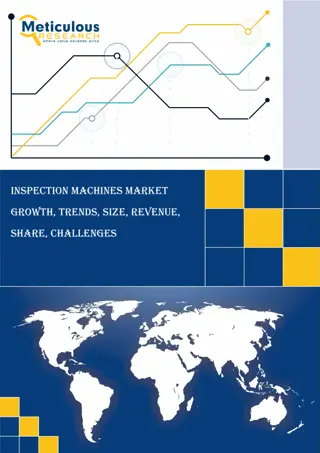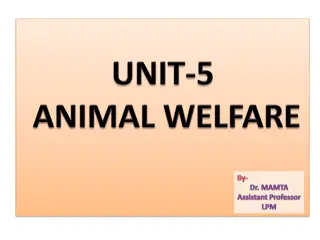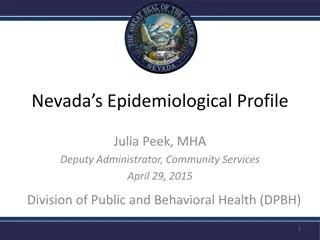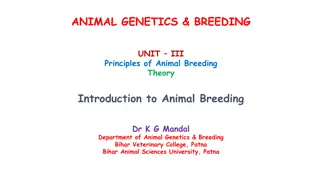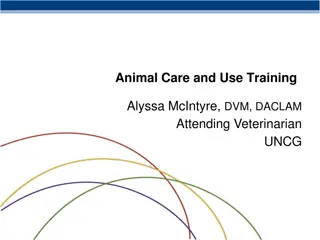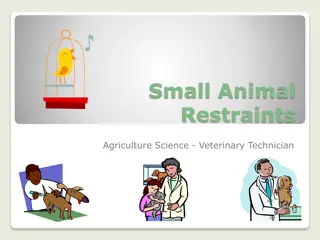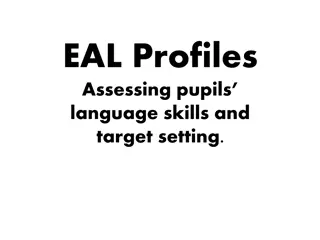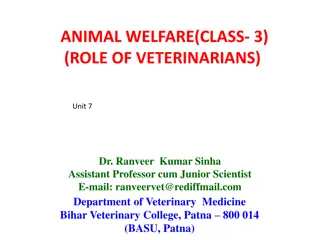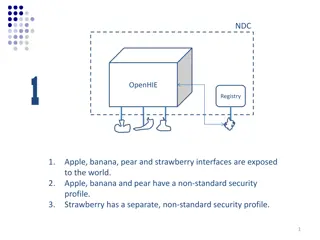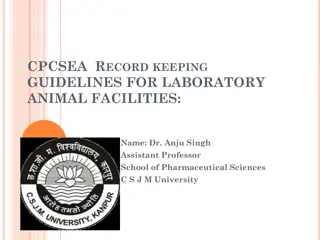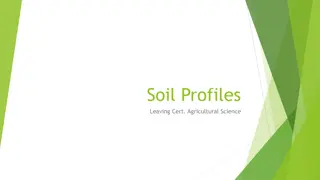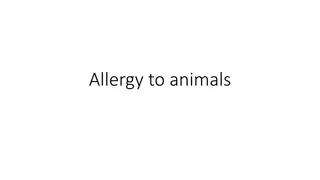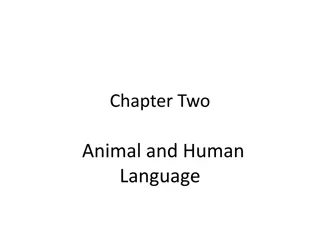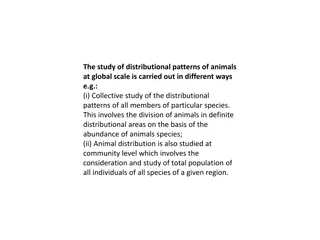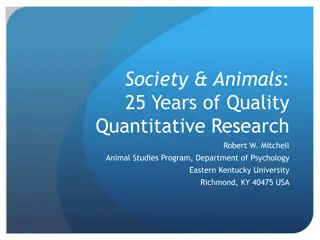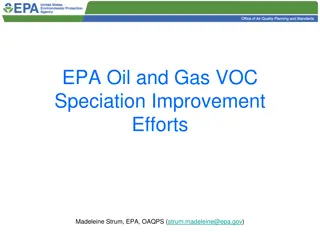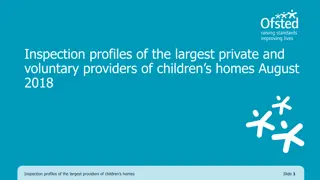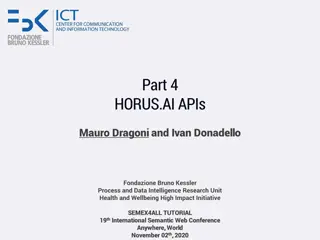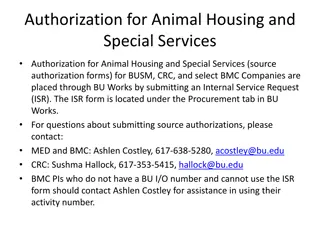History and Educational Programs of DEU Lab Animal Science Department
Established in 2004, the Department of Laboratory Animal Science at Dokuz Eylul University Institute of Health Sciences offers cutting-edge education focusing on animal welfare and ethical practices in scientific research. The department upholds the 3R Principle—Reduction, Refinement, Replacement�
0 views • 9 slides
Responsibilities of Facility Animal Care Committee at McGill University
The Facility Animal Care Committee (FACC) at McGill University oversees animal activities, ensures ethical treatment of animals, and adheres to guidelines from organizations such as the Canadian Council on Animal Care (CCAC). Responsibilities include continual oversight of animals, approving care pr
1 views • 13 slides
Matrimonial Profiles - Seeking Companionship in Diverse Backgrounds
Explore a diverse range of matrimonial profiles featuring individuals of different Hindu backgrounds and citizenships, all seeking compatible partners. From medical professionals to teachers, these profiles showcase individuals with varied interests and aspirations for a happy union. Discover potent
1 views • 29 slides
Feed Software Market is expected to reach $456.1 million by 2030
The growth of this market is attributed to the adoption of digital technologies and automation in the animal feed industry, the growing animal population, increasing demand for healthy animal-based food products, increasing animal health expenditure and pet insurance, and the growing need to reduce
0 views • 4 slides
Animal Welfare and Ethics: Standards and Regulations in India
The content covers a wide range of topics related to animal welfare, ethics, and laws in India. It delves into the definition of animal welfare, the role of veterinarians, animal welfare organizations, regulations like the Prevention of Cruelty to Animals Act, and protection of wildlife, working ani
0 views • 15 slides
Colorado State Epidemiological Profiles - Substance Abuse Trends & Response Task Force
The Colorado State Epidemiological Profiles provide a state-level overview of data from various surveillance sources for prevention, intervention planning, monitoring, and evaluation. The profiles cover demographics, alcohol, marijuana, opioids, sustainability, and next steps. Updated every 2 years,
0 views • 12 slides
Understanding Epidemiological Profiles in Public Health Practice
Epidemiological profiles play a crucial role in substance abuse and mental health planning, helping professionals prioritize issues and raise awareness. The profiles include quantitative and qualitative data to analyze behavioral risk factors, consumption patterns, and clinical outcomes, sourced fro
1 views • 13 slides
Principles of Animal Breeding: Introduction and Historical Perspective
This unit covers the introduction to animal breeding, the application of genetics principles in breeding, historical perspectives including the work of Robert Bakewell, and key events in animal breeding evolution. Topics include breeding systems, importance of animal breeding, and notable figures in
1 views • 12 slides
Importance of Training in Animal Care and Use for Research
Training in animal care and use is essential to ensure humane and appropriate treatment of research animals, promote regulatory compliance, and uphold high standards of science and animal well-being. The presentation covers the necessity of training, goals including reviewing animal use and identify
0 views • 53 slides
Small Animal Restraints and Safe Handling Practices in Veterinary Technology
Importance of safe practice when working with small animals includes preventing harm, reducing injury, and minimizing stress. Proper animal handling methods and tools are crucial for the safety of both animals and handlers. Common methods of handling different species, demonstrating appropriate anim
1 views • 22 slides
Efficient Staffing Strategies for Nursing Units
Implementing effective staffing templates, self-scheduling options, and allowable overstaffing on specialized profiles can enhance data reporting accuracy and ensure adequate nurse coverage. Additional tips for accurate staffing numbers include adjusting profiles, managing floaters, and handling sta
0 views • 5 slides
Understanding the Difference: Animal Rights vs. Animal Welfare
Explore the nuanced distinction between animal rights and animal welfare, delving into the ethical considerations, philosophies, and advocacy efforts surrounding these concepts. Discover how animal rights proponents emphasize the equal rights of animals, while animal welfare focuses on humane treatm
0 views • 36 slides
Utilizing PARE Platform for Student Placements in Leeds
The PARE platform is a cloud-based system used in Leeds for managing student placements. Practice Supervisors, Assessors, and Educators play key roles in supporting students through PARE by maintaining profiles, accessing training, and ensuring accurate records. Practice Education Leads are responsi
0 views • 8 slides
Comprehensive Overview of EAL Profiles and Strategies for Language Skills Assessment
EAL Profiles offer a versatile tool for assessing pupils' language skills and setting targets. They can replace Form 1 documents, aid in transition planning, update progress profiles, and inform teaching strategies. These profiles include sections for pupil information, progress overview, review tab
0 views • 10 slides
Role of Veterinarians in Animal Welfare
Veterinarians, especially with the increasing number of female professionals in the field, play a crucial role in promoting animal welfare through daily practices, advocacy, education, and research. They are involved in various sectors like biomedical, wildlife, and farm animal research, as well as
3 views • 10 slides
Exploring Animal Management and Sociology in Education
Discover the intersection of animal management and sociology in education through a comprehensive course structure that covers topics ranging from animal welfare and ethics to practical husbandry. Dive into the significance of animal care in the UK economy and learn about various career paths in thi
2 views • 19 slides
Comparison of Security Profiles in OpenHIE Registries
OpenHIE exposes interfaces with varying security profiles - non-standard in Scenario 1, standards-based in Scenarios 2 and 3. Scenario 1 requires managing multiple non-standard profiles, whereas Scenarios 2 and 3 facilitate plug-and-play with standard security protocols. Implications include ease of
4 views • 6 slides
Laboratory Animal Facilities Record-keeping Guidelines
Guidelines for maintaining records in laboratory animal facilities include provisions for animal housing, staff records, health monitoring, and standard operating procedures. Compliance with CPCSEA regulations ensures ethical review procedures for animal research proposals. Focus is on providing a s
6 views • 11 slides
Understanding Soil Profiles in Agricultural Science
Soil profiles are essential for classifying soils, with main profiles being Brown Earth, Podzol, and Gley. It's crucial to draw these profiles accurately for exams, considering horizons like O Horizon, A Horizon, B Horizon, and Bedrock. Brown Earth has a thick O horizon with uniform brown color, Pod
1 views • 8 slides
Understanding Allergies to Animals and Living Organisms
Allergies to animals and living organisms are a result of specific immune processes triggered by allergenic substances like proteins and peptides. This allergic response can be caused by various animal proteins such as dog allergens Can f.1, Can f.2, and Can f.3, and cat allergen Fel d1. The represe
1 views • 10 slides
Uniqueness of Human Language and Communication Contrasted with Animal Communication
Human language possesses unique properties such as reflexivity, displacement, and arbitrariness, setting it apart from animal communication. These distinctions enable humans to communicate abstract concepts, discuss past and future events, and use arbitrary linguistic forms. The contrast between hum
1 views • 17 slides
Understanding Global Animal Distribution Patterns
The study of animal distribution patterns at a global scale involves analyzing species abundance and diversity in specific areas. Factors like environmental conditions, latitudes, and evolutionary history influence animal distributions. There are horizontal and vertical zones of animal distribution,
1 views • 25 slides
Exploring Human-Animal Interactions through 25 Years of Quality Research
Delve into the interdisciplinary realm of human-animal interactions with a focus on social sciences and quantitative research. Discover key themes such as social psychology, therapy, animal welfare, and more. Explore attitudes and personality differences related to animal treatment, empathy, and bel
1 views • 26 slides
Efficient User Management System for Health Facilities
Record and manage user details effectively with the new Version 2.0 User Management feature. RNTCP has now registered over 35,000 PHIs, 140,000 Private Health Facilities, 15,000 Private Labs, 31,000 Private Chemists, across 700 Districts and 8,000 TUs in Nikshay. Enhance operations by editing TU pro
0 views • 26 slides
Learn about Rainforest Animals and Create Animal Profiles
In this activity, students will explore the characteristics of animals found in the rainforest such as the parrot, leopard, orangutan, toucan, and more. They will create animal profiles with their partner using German sentences. The profiles will include information on the animals' body parts, respi
0 views • 10 slides
EPA Oil and Gas VOC Speciation Improvement Efforts
EPA's VOC Speciation transforms inventory species into Air Quality model species to support chemistry, ozone, and aerosol chemistry. The Speciate4.5 update in 2016 added oil and gas profiles, including location-specific uncontrolled profiles and WRAP profiles for various basins. The Uinta TMSR profi
2 views • 10 slides
Inspection Profiles of Largest Children's Homes Providers - August 2018
Explore the inspection profiles of the largest private and voluntary providers of children's homes as of August 2018. Gain insights into ownership and inspection outcomes of over 500 homes, highlighting key organizations and national comparisons. Dive into the varying inspection profiles and outcome
0 views • 5 slides
Understanding Wind Profiles and Aerodynamic Roughness Length
Wind profiles are crucial in understanding how wind speed changes with height in the boundary layer. The logarithmic and power law profiles depict this relationship, influenced by surface characteristics and obstacles. The aerodynamic roughness length, defining where wind speed becomes zero, remains
0 views • 14 slides
Evolution of Collisionless Plasma Bounded by Absorbing Walls
Study on the evolution of collisionless plasma between absorbing walls, analyzing rarefaction waves, density profiles, and plasma potential decay. Kinetic simulations reveal gas dynamics-like behavior with flat density profiles and linear velocity profiles leading to asymptotic decay. The influence
0 views • 15 slides
Understanding Traffic Light Profiles for Special Educational Provision
Traffic Light Profiles are tools used to support children with special educational needs by setting termly targets and strategies to help them reach their potential. These profiles are created in consultation with the SENDCO and class teacher, with a focus on addressing the child's needs and trackin
0 views • 6 slides
Evolution of TLS Security Profiles and Best Practices
TLS security profiles have evolved with the introduction of new profiles, retirement of old ones, and emphasis on non-downgrading best practices. Motivated by changes in security threats and cryptographic methods, the IETF has issued recommendations to ensure secure connections using TLS 1.2. The ne
0 views • 5 slides
Upgrading to TOPAZ Elements: Enhancing Animal Protocols, Orders, Census, and Billing
The Animal Resource Facility (ARF) and Office of Animal Care Compliance (OACC) are shifting to TOPAZ Elements, a comprehensive web-based system, to streamline management of animal protocols, orders, census, and billing. This upgrade aims to provide better oversight for PIs, enhance compliance with r
0 views • 8 slides
REST Interface for HORUS.AI Platform - Tutorial Highlights
This tutorial delves into creating profiles and users using the ProfileManager service in the HORUS.AI platform. It covers steps like creating new profiles, adding users to profiles, and setting rules. The focus is on providing a REST interface for seamless interaction with the HORUS.AI system. The
0 views • 15 slides
Understanding Laboratory Animal Genetics and Research Importance
This course (AGB 610) delves into the realm of laboratory animal breeding, exploring the significance of using animals in research and teaching. Dr Shanker Dayal, a distinguished professor, guides students through lectures on animal genetics and the common uses of laboratory animals. The course emph
0 views • 14 slides
Insights from Discussions with Admissions Officials on School Profiles, Grading Scales, and Admissions Criteria
Discussions with university officials shed light on the importance of school profiles, grading scale variations, and admissions criteria. Insights include the significance of school profiles, diversity in grading scales, and the role of NHS in the admissions process. Admissions offices consider fact
0 views • 25 slides
International Protection Needs Profiles in the Caribbean
Identified international protection needs profiles for asylum seekers in the Caribbean region, highlighting main countries of origin such as Cuba, Haiti, Jamaica, and Venezuela. Details include specific profiles and protection needs per country, along with recommended actions when encountering indiv
0 views • 10 slides
Colorado Epidemiological Profiles 2021 - Substance Use Data and Analysis
The 2021 Colorado Epidemiological Profiles provide in-depth data and analysis on substance use patterns, impacts, and demographics in Colorado. The profiles cover alcohol, marijuana, opioids, and tobacco, along with special considerations for populations like LGBTQ, veterans, tribal communities, unh
0 views • 19 slides
Understanding Animal Tissue Culture and Cell Line Production
Animal tissue culture involves growing tissues separate from the animal in a laboratory setting. To achieve exponential cell growth, cells are converted into immortal cell lines. The production of a cell line involves steps like breaking cell adhesion, incubation, and transferring cells to fresh med
0 views • 22 slides
Authorization for Animal Housing and Special Services Process Guidelines
The guidelines outline the process for authorizing animal housing and special services at BUSM, CRC, and select BMC Companies through BU Works via Internal Service Requests (ISR). Investigators must submit ISR forms for animal housing at the Animal Science Center, monitor charges, and provide advanc
0 views • 8 slides
Creating User Profiles for Product or Service Development
Engage in an exercise outlined on page 130 to craft user profiles for a product or service using a partner, pen, paper, and internet resources. Follow the provided template to document your findings and focus on your design problem or the Designing Space Travel brief. Utilize existing data or genera
0 views • 10 slides



